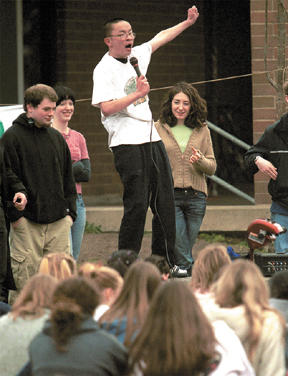School wasn’t officially out, but classes were downsized.
A sheet-sized sign lettered “No Iraq War” formed the backdrop, as more than 200 Bainbridge High students walked out of classes Wednesday morning to rally on school grounds, signing petitions and airing views about the looming conflict.
“Civil disobedience – that’s what today is about, folks,” senior Mackenzie Adams said. “We have to fight. We can’t work within the confines of the system.”
The rally was organized by the Peace Coalition, an after-school anti-war group founded last fall. Student organizers passed out leaflets at school Tuesday afternoon, and notified BHS Principal Dave Ellick Wednesday morning.
“They asked if they could have a bulletin read on the morning announcements,” Ellick said. “I told them I can’t use the school system to support a disruption of the school process.
“On the other hand, we were not going to be out there with fire hoses, either.”
Students gathered around an ad hoc podium, a bench outside one of the campus buildings.
Some came to the rally with strong opinions, like freshman Alyssa Dyke, who wore a T-shirt hand-painted with the slogan: “Peace! No more war.”
Others came to develop their points of view. They heard fellow students read excerpts from writings of Ghandi, Mandela and King, and discuss the current crisis.
“I think our generation has an altered sense of what war is,” junior Nicolie Tusler told the crowd. “We are aware that we would be killing civilians, that 50 percent of the Iraqi population is kids under 10.”
For some students, the impending war is already close to home.
“My brother’s in the Marines,” one freshman said. “He’s going to go. He doesn’t want to. We don’t want him to.”
About 30 students, many with family connections to the military, formed a smaller counter-protest nearby, holding up signs that read “Support our Troops.”
Senior Seth Jacobson, who plans to enlist in the Army after two years of college, said, “I’m here because I think that what our government is doing is right – using the threat of force to get Saddam to do what he said he would. We’ve tried other methods.”
Jacobson was flanked by junior Nick Breslin, who has already enlisted, senior Karen Young, whose brother is a soldier, and junior Dylan Preble, whose cousin, a navy helicopter pilot, will be shipping out soon.
The positions of “peace” and “support for the troops” were claimed by both sides, but viewed from different perspectives. The moral ambiguities of the situation were acknowledged in thoughtful comments.
Junior Marty Souza set the tone when he told the crowd, “Remember that democracy without discussion cannot exist, and that discussion without opposition cannot exist either.”
Speakers on the anti-war side emphasized that they support American troops even if they oppose war with Iraq.
“I want to support our troops,” freshman Ramona Freeborn told fellow students. “I want to support them by not sending them off to die.”
Despite a few catcalls from counter-protesters, the demonstration was peaceful and even featured an exchange of views.
Senior Brian Burns, introduced by the Peace Coalition as a “delegate” from the counter-protest, was invited to take the microphone to address the anti-war crowd.
“I like peace – it’s not that those (counter-protesters) are anti-peace,” Burns said.
“Saddam Hussein has killed 1 million Iraqis. Iraqis want to be liberated, too.”
Freshman Luke Chadwick summed up the dilemmas with which students on both sides grappled – questions that reflect the national debate.
“My friends, I don’t know where to put myself,” Chadwick told the crowd. “I support our troops – but does that mean we have to kill to support our troops?
“My heart goes out to those people in Iraq right now. And, I see our troops going out, families crying. I just want you to know I support them (anti-war protesters) and them (counter-protesters) because we are united. We are the USA.”
The BHS event was one of several at Seattle-area schools.
Organizers, passing out out cookies inscribed with peace signs as students dispersed to rejoin classes, said the turnout had exceeded expectations.
“We wanted to present an easy opportunity for the student body to voice opinions,” Souza said, “and to present ours, which this obviously has done.”
As they left, students chanted: “This is what democracy looks like.”


